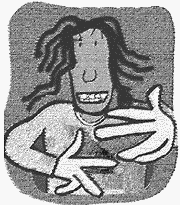Eminem is the latest rap MC to gain acclaim as “the first legitimate white hip-hop artist.” After laboring for several years in the Detroit underground, he was taken under the wing of once-and-future star-maker Dr. Dre, who co-produced Eminem’s first widely distributed album, The Slim Shady LP, and its ubiquitous single, “My Name Is.”
It would be easy—and not entirely unwarranted—to ascribe Eminem’s fame to his skin color. Corporate music bosses have a well-documented, longstanding, and self- fulfilling belief that Caucasian teens find it easier to identify with someone who looks like them. But is a white face really all that Eminem’s fans want? After all, there are plenty of white rappers available, even some with talent (Siah, Yeshua DapoED, Non-Phixion, and El-P, among others). If it’s not his skin or his skills, what is it that sets Eminem apart?
Eminem
The Slim Shady LP(Aftermath/Interscope)
Well, for one thing, he’s funny as hell. Hip-hop has a tradition of deriving humor from exceeding the limits of propriety, and “I can’t believe he said that!” remains one of the highest compliments you can pay an MC. Eminem has certainly earned this honor—if nothing else—with lines like “You wacker than the motherfucker you bit your style from/You ain’t gon’ sell two copies if you press a double album . . . flavor with no seasoning/This is a sneak preview/I’ll diss your magazine and still won’t get a weak review.”
But it doesn’t take long for Eminem’s humor to turn sour. The song “My Fault,” for instance, is a first-person account of accidentally helping an acquaintance overdose on drugs at a party. Eminem’s dead-on depiction of the emergency (trying to decide if it’s really his responsibility, trying to find his friends, trying to convince them he’s serious, trying to hear their advice through a closed bathroom door, etc.) is both humorous—because it’s so completely accurate—and deeply disquieting for exactly the same reason. The song ends with him literally sobbing, “My God . . . I’m so sorry . . . I’m so sorry . . . Susan, please wake up . . . Please . . . Please wake up . . . What are you doing? You’re not dead . . . You’re not dead . . . I know you’re not dead . . . Wake up. . . . ” Are you supposed to laugh at that, or what?
Eminem sabotages his own jokes, pushing them until they’re just not funny anymore, and then he laughs at your discomfort. While this is probably not what you’re looking for in a best friend, it can make for engaging and disturbing music. In many ways, Eminem is like the wimpy kid in elementary school who made fun of himself before the other kids got a chance to. If you laughed at him you were reinforcing his self-esteem problem, but if you didn’t, you were screwing up his only chance at being accepted. There was no way to be on his side: No matter what you did, you were gonna feel like a jerk. Maybe you even began to suspect he was exploiting this perverse dynamic, using his own weakness as a weapon and attacking the world with its own pity.
So it’s hardly surprising that, in addition to the standard allotment of cartoonish bloodshed, The Slim Shady LP contains 16 descriptions of suicide or self-directed violence (that’s right—I counted so you don’t have to). “I tried suicide once and I’ll try it again/that’s why I write songs where I die at the end/’cause I don’t give a fuck/like my middle finger was stuck/and I was wavin’ it at everybody, screamin’, ‘I suck!'” This is not typical fare for a hip-hop lyricist of any shade.
But what really distinguishes Eminem from other light-skinned MCs is that he doesn’t think it’s cooler to be black. He just hates being white. “I’m tired of being white trash, broke, and always poor/Tired of takin’ pop bottles back to the party store. . . . Tired of not drivin’ a BM/Tired of not workin’ at GM/Tired of wanting to be him/Tired of not sleeping without a Tylenol PM,” he raps in “If I Had.” In Eminem’s world, whiteness doesn’t represent power or privilege, but working-class anxiety. The reality of that equation for a huge segment of American society is something that has rarely, if ever, been addressed in hip-hop music.
At the same time, though, Eminem is allowed to say these things because he is white. Can you imagine a black artist who mixes extreme violence, crass humor, intense self-hatred, and pointed class-consciousness? Can you imagine him on MTV? Major-label executives certainly can’t. And that racial disparity is itself the result of another concept they can’t imagine: that Eminem would ever actually do those awful things he rhymes about; for all his controversial lyrics, Eminem is successful precisely because he’s not considered a real threat. Black artists, by contrast, rarely get the benefit of that particular doubt—just ask Ice T, whose major-label career melted away after he recorded a song about killing police officers.
As an artist and a businessman, Eminem clearly knows what he’s doing. And like that kid in elementary school, he dares you to hate him for it. Or as he phrases it: “Put my tape back on the rack/Go run and tell your friends my shit is wack/I just don’t give a fuck.”





